VIDEOS
Videos from the Lowy Institute, including of events with prime ministers, global media proprietors, leading intellectuals, and the most influential world leaders of our generation.
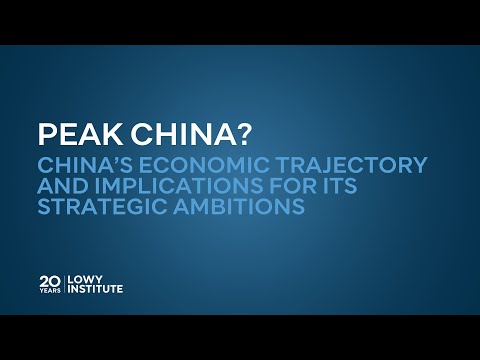
China’s remarkable economic rise has long been a key factor in global geopolitical discussions. But how soon and at what height will China’s economy peak? What are the implications for China’s ambitions in the world?
For years, predictions suggested that China's economic power would surpass that of the United States by the end of this decade. However, recent developments, backed by Lowy analysis, have challenged this assumption.
In this event in which we unpacked the findings of original Lowy Institute research and explored the concept of ‘Peak China’ with the Lowy Institute’s Lead Economist Roland Rajah, Senior Fellow for East Asia Richard McGregor and Nonresident Fellow Dr Jenny Gordon.
The event was moderated by Director of Research Hervé Lemahieu. Our panellists discussed the implications of this potential turning point and what it means for China's future prospects, as well as the repercussions it may have for the rest of the world.
Roland Rajah is Lead Economist at the Lowy Institute and the Director of the Indo-Pacific Development Centre. A development economist by background, Roland has extensive experience working across both emerging Asia and the small island developing states of the Pacific. He has previously worked for the Asian Development Bank, Australian Department of Foreign Affairs and Trade, the Australian Agency for International Development (AusAID), and the Reserve Bank of Australia. Roland is the co-author with Alyssa Leng of the influential Lowy Institute Analysis paper Revising down the rise of China.
Richard McGregor is Senior Fellow for East Asia at the Lowy Institute. He is a former Beijing and Washington bureau chief for the Financial Times and the author of numerous books on East Asia including Xi Jinping: The Backlash (2019) and Asia’s Reckoning: China, Japan and the Fate of U.S. Power in the Pacific Century (2017). His 2010 book, The Party, on the inner workings of the Chinese Communist Party, was translated into seven languages and chosen by the Asia Society and Mainichi Shimbun in Japan as their book of the year.
Jenny Gordon is a Nonresident Fellow at the Lowy Institute and former Chief Economist at the Australian Department of Foreign Affairs and Trade. Dr Gordon is a member of the Australian International Agricultural Research Centre’s Monitoring, Evaluation and Learning Advisory Panel, and the Asian Development Bank Institute’s Advisory Committee. She is also an Honorary Professor at ANU's Centre for Social Research and Methods.
WHEN & WHERE:
Thursday 22nd June | 12:00pm for 12.15pm to 1.15pm
31 Bligh Street, Sydney
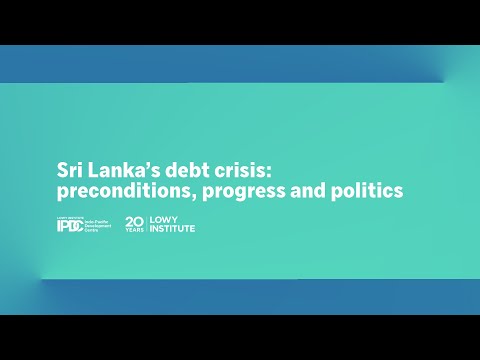
Sri Lanka defaulted on its external debt for the first time in its history in April 2022. Sri Lankans faced acute shortages of food, fuel and other basic supplies as government responses took hold, including stringent capital controls introduced to preserve dwindling foreign reserves.
Almost a year later, the International Monetary Fund approved a US$3 billion program to boost Sri Lanka's reserves and assist with debt servicing. The road ahead for Sri Lanka is still uncertain: the country needs to strike a deal with creditors, including its biggest bilateral lender, China — and also ensure that a domestic debt restructure deal is settled beforehand.
An event hosted by the Lowy Institute brought together a range of experts to discuss Sri Lanka’s debt crisis. The panel included Indrajit Coomaraswamy, former Governor of the Central Bank of Sri Lanka, Brad Setser, a sovereign debt restructure expert at the Council of Foreign Relations, and Mariza Cooray, Research Fellow and senior economist at the Lowy Institute’s Indo-Pacific Development Centre. The discussion was hosted by Roland Rajah, the Lowy Institute’s Lead Economist and Director of the Indo-Pacific Development Centre.
Dr Indrajit Coomaraswamy was the Governor of the Central Bank of Sri Lanka from 2016 to 2019. He has more than 40 years of experience in policymaking and economic advisory services on both macroeconomic and structural issues at national and intergovernmental levels. A year into his term, Dr Coomaraswamy was recognised as the “Central Bank Governor of the Year for South Asia” for 2019 by Euromoney Institutional Investor Group PLC. He served as the Deputy Director of the Secretary-General's office as well as the Director of Economic Affairs during his tenure at the Commonwealth Secretariat between 1989 and 2008. He holds a PhD in Economics from the University of Sussex and a BA from the University of Cambridge.
Dr Brad Setser is a Senior Fellow at the Council on Foreign Relations in Washington, DC. He served as a senior adviser to the US Trade Representative from 2021 to 2022, where he worked on the resolution of a number of trade disputes. He also served as the Deputy Assistant Secretary for international economic analysis in the US Treasury from 2011 to 2015, where he worked on Europe’s financial crisis, currency policy, financial sanctions, commodity shocks, and Puerto Rico’s debt crisis, and as a director for international economics on the staff of the National Economic Council and the National Security Council. He is the author of Sovereign Wealth and Sovereign Power (CFR, 2008) and the co-author, with Nouriel Roubini, of Bailouts and Bail-ins: Responding to Financial Crises in Emerging Economies (Peterson Institute, 2004). He holds a BA from Harvard University, a masters from Sciences-Po Paris, and an MA and PhD in international relations from Oxford University.
Mariza Cooray is a Research Fellow and senior economist in the Lowy Institute’s Indo-Pacific Development Centre. She has a decade of experience living and working in the Pacific and Indonesia for the Department of Foreign Affairs and Trade, USAID and the Asian Development Bank. She has also worked as a Country Economist for the World Bank in Sri Lanka and began her career in international development in Sri Lanka. Her research interests include public finance, debt management and crisis, poverty and inequality, growth and emerging markets. Mariza has postgraduate qualifications in Mathematics from the Australian National University, a Master of Science in Development Economics from the London School of Economics, where she was an LSE PJD Wiles Scholar, and a BA in Economics from Wilson College in Pennsylvania in the United States. She speaks Sinhalese and Spanish and understands Mandarin.
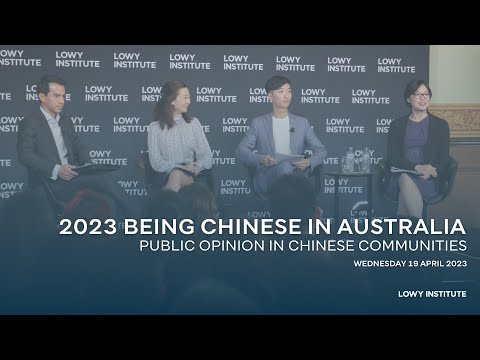
On 19 April, the Lowy Institute hosted the launch of the 2023 Being Chinese in Australia: Public Opinion in Chinese Communities survey report with author and Lowy Institute Research Fellow Dr Jennifer Hsu, along with guests Samuel Yang and Lucy Du. The event was chaired by the Director of the Institute's Public Opinion and Foreign Policy Program, Ryan Neelam.
Dr Jennifer Hsu is a Research Fellow and the Project Director of the Multiculturalism, Identity and Influence Project at the Lowy Institute. After completing her PhD in Development Studies at the University of Cambridge, she researched and taught development studies, political science and sociology in universities in North America and the United Kingdom. Jennifer is also a Senior Visiting Fellow at the Social Policy and Research Centre at the University of New South Wales. Her research expertise covers state-society relations, state-NGO relations, the internationalisation of Chinese NGOs, civil society and the Chinese diaspora and she has published widely in these areas.
Samuel Yang is a Chinese-Australian bilingual journalist and presenter. He is currently a co-host of China Tonight on ABC TV. He joined the ABC in 2018 and has previously worked as a business reporter and presenter in Sydney, and a bilingual reporter and producer in Melbourne. He has lived across the Asia-Pacific including in China, Singapore and New Zealand. His work has won the NSW Premier’s Multicultural Communications Public Interest Award and he was nominated for Young Journalist of the Year in 2020.
Lucy Du is the CEO of the Australia-China Young Professionals Initiative (ACYPI), the single largest young professionals organisation in the Australia-China space. She began her career in Canberra and then went on to work in China for one of Australia’s big four banks and later for the Department of Foreign Affairs and Trade in Shanghai. She is currently Head of Community at Belz Family & Associates, a global private assets investment platform for Asian and Australian investors. Lucy is bilingual in English and Chinese and has completed studies at the University of Melbourne, Australian National University and Tsinghua University.
Ryan Neelam is Director of the Public Opinion and Foreign Policy Program and is Project Lead on the annual flagship publication, the Lowy Institute Poll. Before joining the Institute, Ryan spent 14 years as an Australian diplomat including as Deputy Consul-General in Hong Kong, and at the Australian Mission to the UN. Ryan has contributed to policy development and international agreements on economic, climate change, human rights and security issues.
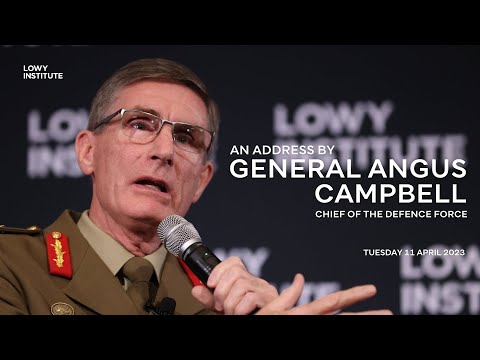
With the announcement of Australia’s pathway towards nuclear-powered submarines, and the forthcoming release of the Government’s response to the Defence Strategic Review, this event offered the rare opportunity to hear from Australia’s most senior military officer about the international security environment and how Australia is responding to it. After his remarks, General Angus Campbell AO DSC spoke in conversation with the Lowy Institute's Executive Director Dr Michael Fullilove AM.
General Campbell joined the Australian Army in 1981, graduating from the Royal Military College, Duntroon in 1984. In 2005, he joined the Department of Prime Minister and Cabinet as a First Assistant Secretary to head the Office of National Security and was subsequently promoted to Deputy Secretary and appointed to the position of Deputy National Security Adviser. Upon his return to the Australian Defence Force in early 2010, he was appointed to the rank of Major General. In 2015, he was appointed Chief of the Australian Army, and in 2018 appointed to command of the Australian Defence Force.
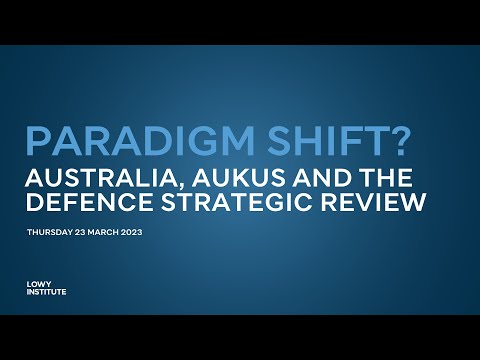
The announcement of Australia’s preferred technology pathway for the acquisition of nuclear-powered submarines has been described as the most significant shift in the country’s strategic outlook since the Second World War. Coupled with the forthcoming publication of the Defence Strategic Review, Australia’s national security environment is set for significant change. What is the future of Australian defence policy, Australia’s place in the region, and its relations with the United States and the United Kingdom? For this panel discussion, Sam Roggeveen, Director of the Lowy Institute’s International Security Program, spoke with Dr Charles Edel, Dr Lavina Lee and Justin Burke about the big decisions shaping Australia’s national security policy.
Dr Charles Edel is the inaugural Australia Chair at the Center for Strategic and International Studies (CSIS) in Washington, DC. He previously taught at the University of Sydney, where he was also a senior fellow at the United States Studies Centre. Prior to that, he was a professor of strategy and policy at the US Naval War College and served on the US Secretary of State’s Policy Planning Staff from 2015 to 2017.
Dr Lavina Lee is a senior lecturer in the Department of Security Studies and Criminology at Macquarie University in Sydney. She is a member of the Council of the Australian Strategic Policy Institute and a nonresident fellow at the Center for Strategic and International Studies (CSIS) and the United States Studies Centre at the University of Sydney.
Justin Burke is the 2022 Thawley Scholar in International Relations at the Lowy Institute and Center for Strategic and International Studies (CSIS). He is a nonresident fellow with the Institute for Security Policy at the University of Kiel in Germany. Justin is a PhD candidate in naval power at Macquarie University and was previously a journalist with The Australian and Japan’s Yomiuri Shimbun.

The inaugural FDC Pacific Lecture was given by the Prime Minister of Samoa, Fiamē Naomi Mataʻafa at Old Parliament House, Canberra on Monday 20 March 2023.
The Hon Fiamē Naomi Mataʻafa is Samoa’s seventh prime minister and the first woman to be elected to the role. She was also the country’s first female cabinet minister and deputy prime minister. As the leader of the Faʻatuatua i le Atua Samoa ua Tasi (FAST) party, she became prime minister after elections in 2021. Prime Minister Fiamē was first elected to parliament in 1985 and was appointed to her first cabinet ministry in 1991, going on to serve in a range of portfolios including Education, Justice and Environment. From 2006 to 2012, she was the chair and pro-chancellor of the University of the South Pacific.
The FDC Pacific Lecture has been established with the support of the Foundation for Development Cooperation, which has also established the FDC Pacific Fellowship in conjunction with the Lowy Institute.
The Prime Minister was introduced by the Australian Minister for International Development and the Pacific, Hon Pat Conroy MP. After her remarks, Prime Minister Fiamē spoke in conversation with the Lowy Institute's Executive Director, Dr Michael Fullilove AM.
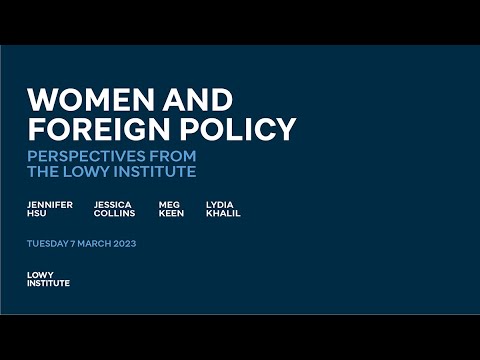
Over the past decade, there has been more emphasis on gender in foreign policy and national security. What does this mean? Should foreign policy be a vehicle for the promotion of gender equality and how is that in Australia’s interest? How are women in foreign policy and national security leadership positions making an impact on the world stage? And are we witnessing a global backlash against women’s rights?
To mark International Womens Day the Lowy Institute hosted this event featuring researchers Jennifer Hsu, Jessica Collins and Meg Keen for a conversation chaired by Lydia Khalil to discuss these issues and offer their perspectives as women working in the field.
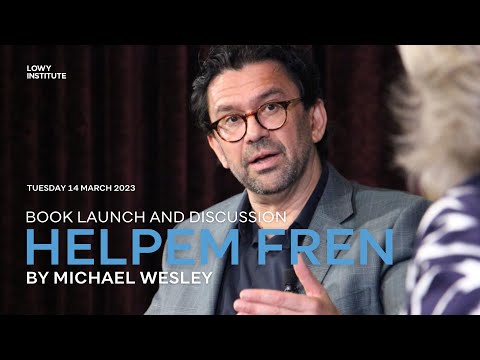
On 14 March 2023, Australian foreign policy expert and former Lowy Institute Executive Director Professor Michael Wesley launched his new book Helpem Fren: Australia and the Regional Assistance Mission to Solomon Islands (MUP 2023). The book is the first comprehensive history of Australia’s RAMSI intervention, which was aimed at preventing the collapse of the Pacific Island state. Helpem Fren draws on still-classified official documents and more than 30 interviews to explore the motivations and dynamics behind the 14-year Pacific-wide mission — a project that cost more than $2 billion and involved thousands of soldiers, police and public servants from Australia and across the Pacific. RAMSI was remarkably successful in an age of disastrous interventions, yet its legacy has largely vanished from Australia’s public consciousness. Professor Wesley joined the Lowy Institute’s Pacific Islands Program Director Meg Keen, to discuss the challenges of interventions and development assistance in a Pacific that is more geopolitically contested than it has been for 70 years.
Michael Wesley is Deputy Vice-Chancellor International and Professor of Politics at the University of Melbourne. His research and writing focus on Australian foreign policy and the international affairs of Asia and the Pacific. Previously, he was Dean of the College of Asia and the Pacific at the Australian National University. He has also held positions as Executive Director of the Lowy Institute, Director of the Griffith Asia Institute at Griffith University, and Assistant Director-General for Transnational Issues at the Office of National Assessments. He has a PhD in International Relations from the University of St Andrews.
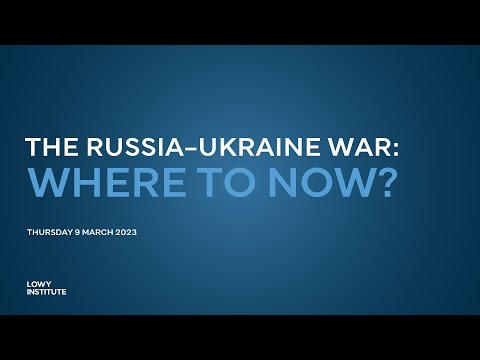
Entering the second year of the Russia–Ukraine conflict the Lowy Institute hosted a a conversation with two compelling speakers about what 2023 will bring. Retired Australian Army Major General Mick Ryan has become a globally recognised commentator on the military campaign in Ukraine, while Ukrainian-born journalist Zoya Sheftalovich (POLITICO) has recently returned from Europe, where she covered President Zelenskyy’s visits to London and Brussels. The conversation was chaired by Sam Roggeveen, Director of the International Security Program.
Major General (Ret’d) Mick Ryan is a Nonresident Fellow at the Lowy Institute. He spent 35 years in the Australian Army. His operational service includes deployments to East Timor, Iraq and southern Afghanistan. His book, War Transformed: The Future of Twenty-First-Century Great Power Competition and Conflict, was published in 2022.
Zoya Sheftalovich is a contributing editor for POLITICO, currently based in Sydney. She is also a regular commentator on the Ukraine war for ABC News 24.